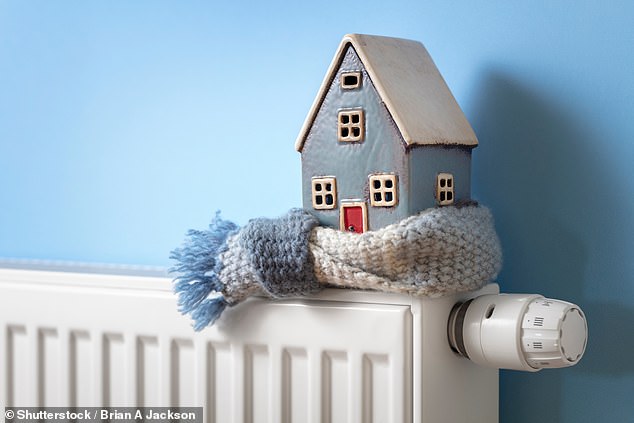I am retired and spend most days alone in the house. I try to avoid turning on the heat during the day to save money, but sometimes I get really cold.
I’m not on the poverty line, but I’m missing my winter fuel payment and need to keep my energy bills down.
I spend most of my time in the living room. Would it be cheaper to turn on the central heating a bit to warm it up or use a fan heater I have just to heat that room?
My house is a two bedroom Victorian terrace and has no insulation except in the loft. My fan heater is 2kw and I have a 30kw combination boiler.
This Is Money’s Sam Barker responds: Cold weather is here, and with it comes energy bills.
Ofgem’s energy price cap, currently £1,717 a year for average energy use, will rise by 1.2 per cent to £1,738 on 1 January 2025.
I’m also sorry to hear that you are losing your Winter Fuel Payment, which last winter was worth up to £300 per pensioner.
Warming Up: As the weather gets colder, our focus turns to staying warm and saving money.
In a typical home, more than half of the energy bill is spent on heating and hot water, according to the Energy Saving Trust.
As such, heating questions are some of the most common questions we get asked at This is Money.
Unfortunately, it is also almost impossible to answer them with a high level of accuracy, since every home is different.
Likewise, how much you pay for energy, your appliances, how cold it is, and even the length of the pipes in your home make a difference.
I have done some rough sums which show that it is much cheaper per hour to run a fan heater than central heating, but with some very important caveats.
Ultimately, the decision between a fan heater or central heating is a personal one. The sums I am about to do are a very direct way of approaching the issue, which should really be approached as a compromise between the warmth, the cost, the state of repair of your house and how it is lived in during the winter months. winter.
For example, a 2kw fan heater would cost 49p to run for one hour, assuming it is on the typical price-capped energy deal where electricity unit rates are capped at 24.5p per kilowatt-hour (kWh). ).
By comparison, your 30kw combi boiler should cost £2.06 to run your central heating for an hour, assuming you pay 6.24p per kWh for gas at capped rates and your boiler has an efficiency of 90 percent.
Therefore, if you are only in one room, it would be much cheaper to use the fan heater than to turn on the central heating. It would even be cheaper to use the fan heater to heat one room and then take the heater to another room and heat it, than to turn on central heating.
However, this is not an entirely fair comparison.
Your fan heater, of course, only heats one room for 49p an hour, while that £2.06 figure would be the approximate cost of heating all your radiators, across several rooms.
Of course, you can turn off some of your radiators, which would reduce the figure to £2.06 per hour.
But heating more than one room has obvious advantages, both for you and for the sake of the property.
Heating is important to keep rooms dry and prevent the build-up of moisture and mold, which will also cost money to repair and could even make you sick. Victorian homes, as you probably know, can be prone to this.
An advantage of central heating is that heat also radiates from the pipes, even with insulation, meaning that much more of the house is heated than just the parts near the radiators.
Heat from a radiator also tends to linger longer than that from a heater, since the metal of the radiator retains heat, as does any nearby brick.
Danielle Michalska-Morris, group technical innovation manager at David Wilson Homes, says: “While electric blankets and space heaters may be cheaper to use in the short term, it’s important to remember that they only heat part of the home. and should not be left on for long periods of time.
‘Leaving electric heaters on all day is not cost effective; For example, a 2kW fan heater costs approximately 49p per hour when running at full power. Using it for four hours a night would cost a total of £1.96 and, over the course of a week, could add up to £13.72.
‘In comparison, a 24kW gas boiler costs around £2 to heat the whole house, so you will need to consider which option suits you best at the time.
“For those who feel cold, a good alternative to electric blankets and heaters is a traditional hot water bottle, which means you just have to boil the kettle.”
How much does fan heaters cost to run?
Each appliance has a power rating, usually expressed in watts (W) or kilowatts (kW) and 1000W is equivalent to 1kW.
This tells you how much electricity it uses and how much it will cost will depend on how long it is on.
Electricity is sold by kWh, which is usually listed as “units” on the bill.
You can calculate how much it costs to run an electrical appliance by multiplying the power of the device by the number of hours you use it and then by the cost of electricity.
Some links in this article may be affiliate links. If you click on them, we may earn a small commission. That helps us fund This Is Money and keep it free to use. We do not write articles to promote products. We do not allow any commercial relationship to affect our editorial independence.

